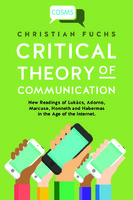Critical Theory of Communication: New Readings of Lukács, Adorno, Marcuse, Honneth and Habermas in the Age of the Internet
| dc.contributor.author | Fuchs, Christian | |
| dc.date.accessioned | 2016-12-31 23:55:55 | |
| dc.date.accessioned | 2018-09-10 11:37:46 | |
| dc.date.accessioned | 2020-04-01T13:57:00Z | |
| dc.date.available | 2020-04-01T13:57:00Z | |
| dc.date.issued | 2016 | |
| dc.identifier | 619390 | |
| dc.identifier | OCN: 982244626 | en_US |
| dc.identifier.uri | http://library.oapen.org/handle/20.500.12657/32047 | |
| dc.description.abstract | "This book contributes to the foundations of a critical theory of communication as shaped by the forces of digital capitalism. One of the world's leading theorists of digital media Professor Christian Fuchs explores how the thought of some of the Frankfurt School’s key thinkers can be deployed for critically understanding media in the age of the Internet. Five essays that form the heart of this book review aspects of the works of Georg Lukács, Theodor W. Adorno, Herbert Marcuse, Axel Honneth and Jürgen Habermas and apply them as elements of a critical theory of communication's foundations. The approach taken starts from Georg Lukács Ontology of Social Being, draws on the work of the Frankfurt School thinkers, and sets them into dialogue with the Cultural Materialism of Raymond Williams.Critical Theory of Communication offers a vital set of new insights on how communication operates in the age of information, digital media and social media, arguing that we need to transcend the communication theory of Habermas by establishing a dialectical and cultural-materialist critical theory of communication. It is the first title in a major new book series 'Critical Digital and Social Media Studies' published by the University of Westminster Press." | |
| dc.language | English | |
| dc.subject.classification | thema EDItEUR::G Reference, Information and Interdisciplinary subjects::GT Interdisciplinary studies::GTC Communication studies | en_US |
| dc.subject.classification | thema EDItEUR::Q Philosophy and Religion::QD Philosophy | en_US |
| dc.subject.classification | thema EDItEUR::J Society and Social Sciences::JB Society and culture: general::JBC Cultural and media studies::JBCT Media studies | en_US |
| dc.subject.classification | thema EDItEUR::J Society and Social Sciences::JH Sociology and anthropology::JHB Sociology | en_US |
| dc.subject.other | marxist theory | |
| dc.subject.other | habermas | |
| dc.subject.other | social media | |
| dc.subject.other | digital media | |
| dc.subject.other | theories of communication | |
| dc.subject.other | frankfurt school critical theory | |
| dc.subject.other | Capitalism | |
| dc.subject.other | Dialectic | |
| dc.subject.other | György Lukács | |
| dc.subject.other | Herbert Marcuse | |
| dc.subject.other | Theodor W. Adorno | |
| dc.title | Critical Theory of Communication: New Readings of Lukács, Adorno, Marcuse, Honneth and Habermas in the Age of the Internet | |
| dc.type | book | |
| oapen.identifier.doi | 10.16997/book1 | |
| oapen.relation.isPublishedBy | 2725c638-53f3-4872-9824-99c3555366f3 | |
| oapen.relation.isbn | 9781911534051;9781911534068;9781911534075 | |
| oapen.pages | 230 | |
| oapen.remark.public | Relevant Wikipedia pages: Capitalism - https://en.wikipedia.org/wiki/Capitalism; Critical theory - https://en.wikipedia.org/wiki/Critical_theory; Dialectic - https://en.wikipedia.org/wiki/Dialectic; Frankfurt School - https://en.wikipedia.org/wiki/Frankfurt_School; György Lukács - https://en.wikipedia.org/wiki/Gy%C3%B6rgy_Luk%C3%A1cs; Herbert Marcuse - https://en.wikipedia.org/wiki/Herbert_Marcuse; Social media - https://en.wikipedia.org/wiki/Social_media; Theodor W. Adorno - https://en.wikipedia.org/wiki/Theodor_W._Adorno | |
| oapen.identifier.ocn | 982244626 |

